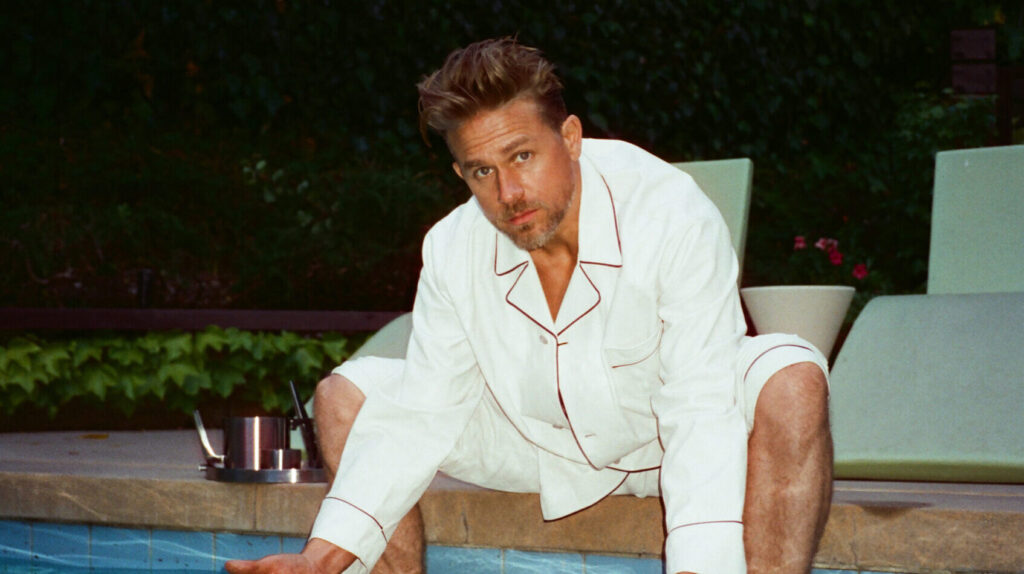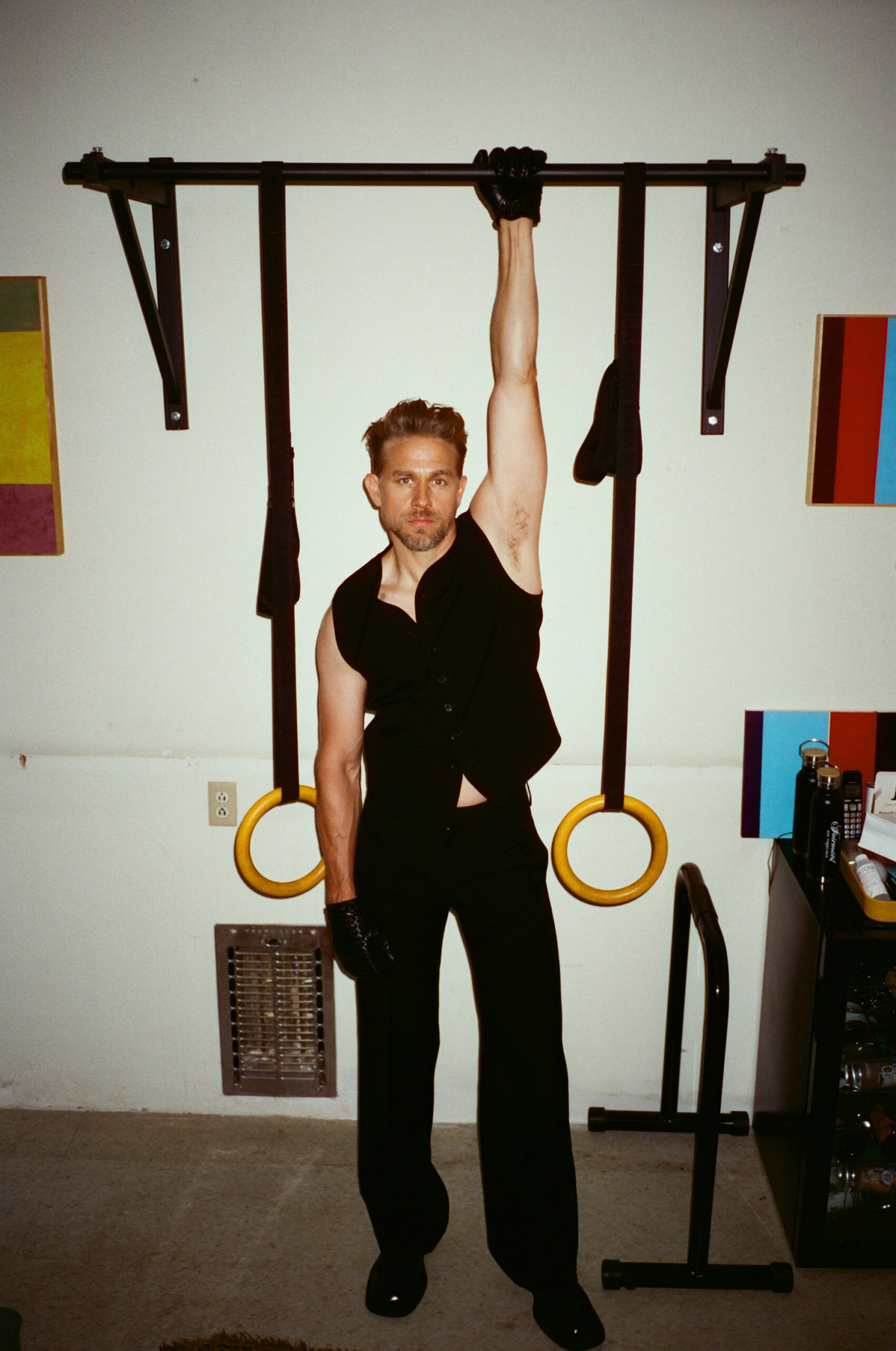
Charlie Hunnam wears Vest, Pants, and Shoes Calvin Klein Collection. Gloves Bottega Veneta.
Charlie Hunnam has played gangsters, bikers, and bruised antiheroes, but nothing could prepare him for crawling into the skin of America’s original psycho, Ed Gein. In the latest installment of Ryan Murphy’s Monster series, the British actor descended into the psyche of the killer who inspired Psycho, The Texas Chainsaw Massacre, and The Silence of the Lambs—and he didn’t walk away unscathed. To mark the moment, Hunnam and Murphy reunited for a debrief on what it takes to find some heart in the darkness.
———
WEDNESDAY 5 PM AUG. 13, 2025 LA
RYAN MURPHY: Hello!
CHARLIE HUNNAM: Hey, Ryan.
MURPHY: What’s happening?
HUNNAM: We’re here!
MURPHY: Good to see you. So Charlie, why don’t you start asking me questions? I’m always asking you questions.
HUNNAM: Let’s start with the big one. What scares you, Mr. Murphy?
MURPHY: God, what scares me? I don’t really have an answer to that, other than the typical stuff about something happening to my family. Horror things don’t scare me. I’m more afraid of natural disasters—tsunamis, earthquakes, things like that. And yet I’m also drawn to watching videos about them. What scares you?
HUNNAM: It’s a difficult question, which I thought was reason for us to discuss it. I think time? I have an unhealthy, or maybe an ultra-healthy, appreciation for time. I get most anxious when I feel like I’m not using it judiciously. I’m 45 now and realizing if I’m going to get through this long list of ambitions and hopes and desires, whether it be taking photographs again or starting a family—
MURPHY: I started a family at 45, so I get that. What’s one thing other than a family that you need to get done in your lifetime?
HUNNAM: I’ve got a lot of creative things that I still want to do and a lot of stories that I’d like to tell as a writer, that I would also like to act in. I’d like to travel a lot more than I have, and not in the context of work but in the context of true adventure. I’ve done that only once before, where I went to India with a hotel booked for one night and no plan beyond that. I wanted to just go where the country took me. It was everything I hoped it would be, both the good and the bad.
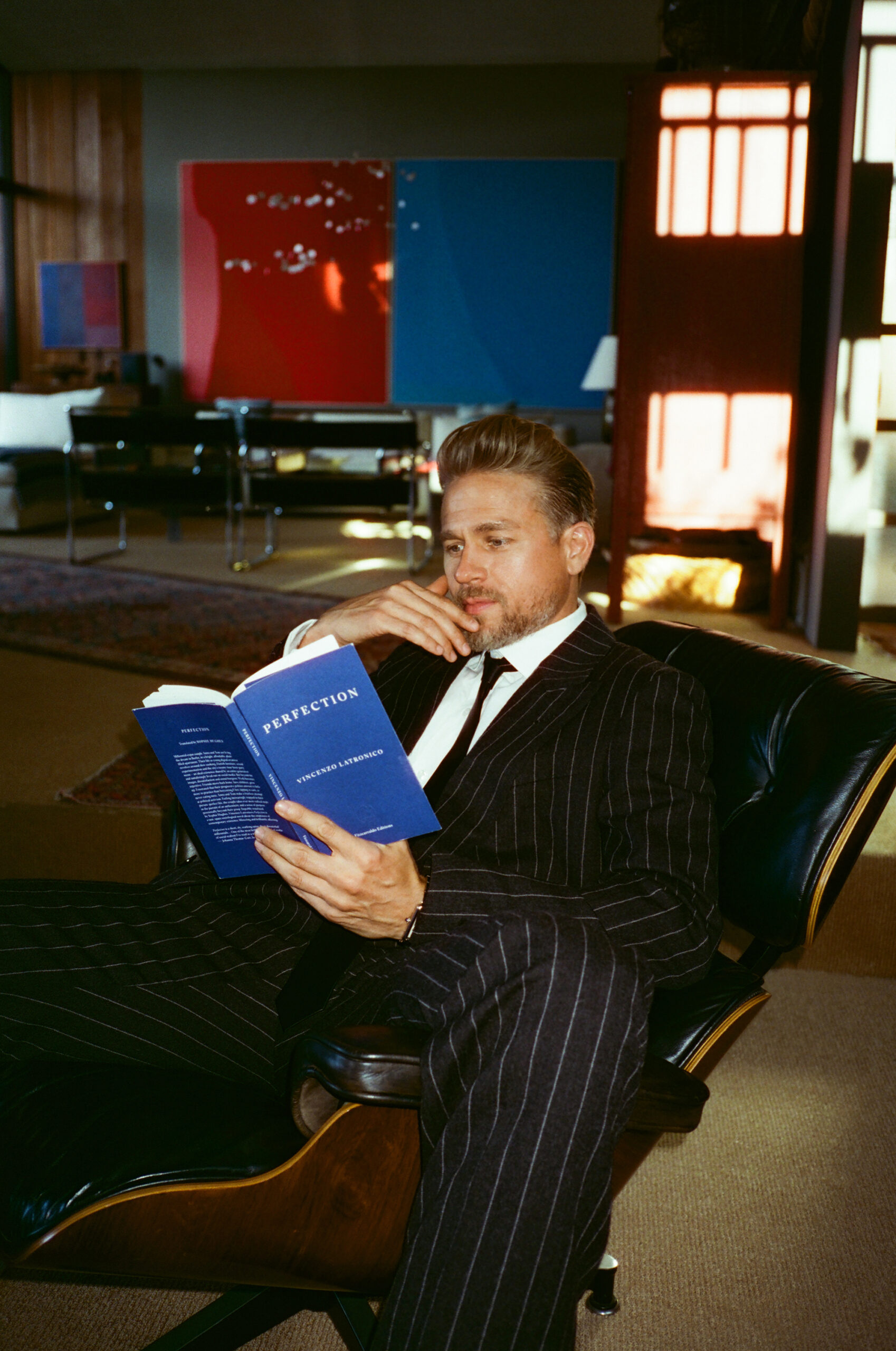
Suit, Shirt, and Tie Tom Ford. Watch Cartier.
MURPHY: I love that. I’ve worked with a lot of people at this point in my career, and you were always on my bucket list, whether you know that or not. We were younger gents in the early FX days. I was doing Nip/Tuck and then American Horror Story, and you were doing Sons of Anarchy. So I always saw you across the crowded room and did the show business wave.
HUNNAM: You saw me at my worst and my darkest, and maybe my most heroic.
MURPHY: [Laughs] Exactly, which we shan’t talk about. I believe I might’ve told you this before, but you were my first and only choice for the part. I felt very strongly that if you did not do it, I wasn’t sure that I wanted to do it. Obviously I knew you were a great actor; however, I was not prepared for the level that you go to in this part. I think you’d agree that it’s the strongest and probably the most diffi cult performance of your career. I was absolutely shocked that you pretty much said yes in the pitch meeting, and I know it was because I was so passionate. I was singing for my supper. But I guess my question is, now that I’ve told you this, was there ever a moment after you signed on where you got terrified and realized, like, “Holy shit, this is almost a King Lear of parts?” It’s so huge and it follows him from his late teens to his early twenties to his death in his seventies.
HUNNAM: I got very afraid. After our initial conversation, which you alluded to, I was so seduced and thrilled by your passion for this character. I was going away to do another job, so I didn’t immediately jump into doing research on my own, and then it came time to start prepping for this. I think I read every book written on Ed Gein, and it started to be come impossibly bleak to me. I really wanted to challenge myself in my career at this point in life, and this seemed like a golden opportunity to play a type of character I’ve never played before. But the darkness of it really scared me. And finding the truth in who he was felt like it was going to force me to go to a place that I didn’t necessarily want to go.
MURPHY: The interesting thing is I never felt that. Every time I’d write a script with Ian Brennan, I would say, “Well, I’m sure we’re going to hear from Charlie about this scene,” because it was such difficult material. But you never fought it or questioned it, you just gave into it.
HUNNAM: The turning point was when you sent me the first three episodes. I had been caught in the “what” of what Ed did, and then when I read the episodes, I was brought back into what you were interested in—not these sensationalist grotesque explorations of depravity, but why this human being did the things that he did.
MURPHY: People are starting to see it, and the comment that I get over and over and over again is, “How in the world did you make me have sympathy for Ed Gein?” Which to me says we did our job, because the thesis of the show asks the question, “Are monsters made or are they born?” This season more than any, we really talk about mental abuse, toxic masculinity, and the responsibility of an artist. So when I hear that, I would say congratulations to you and to Max [Winkler, the director] and Ian and all of us who made it because we were very conscious of that—not condoning what he’s doing, but by that last episode, all we’re really asking is that you understand that he was a human being who somehow got off track. What was your most challenging scene in the show?
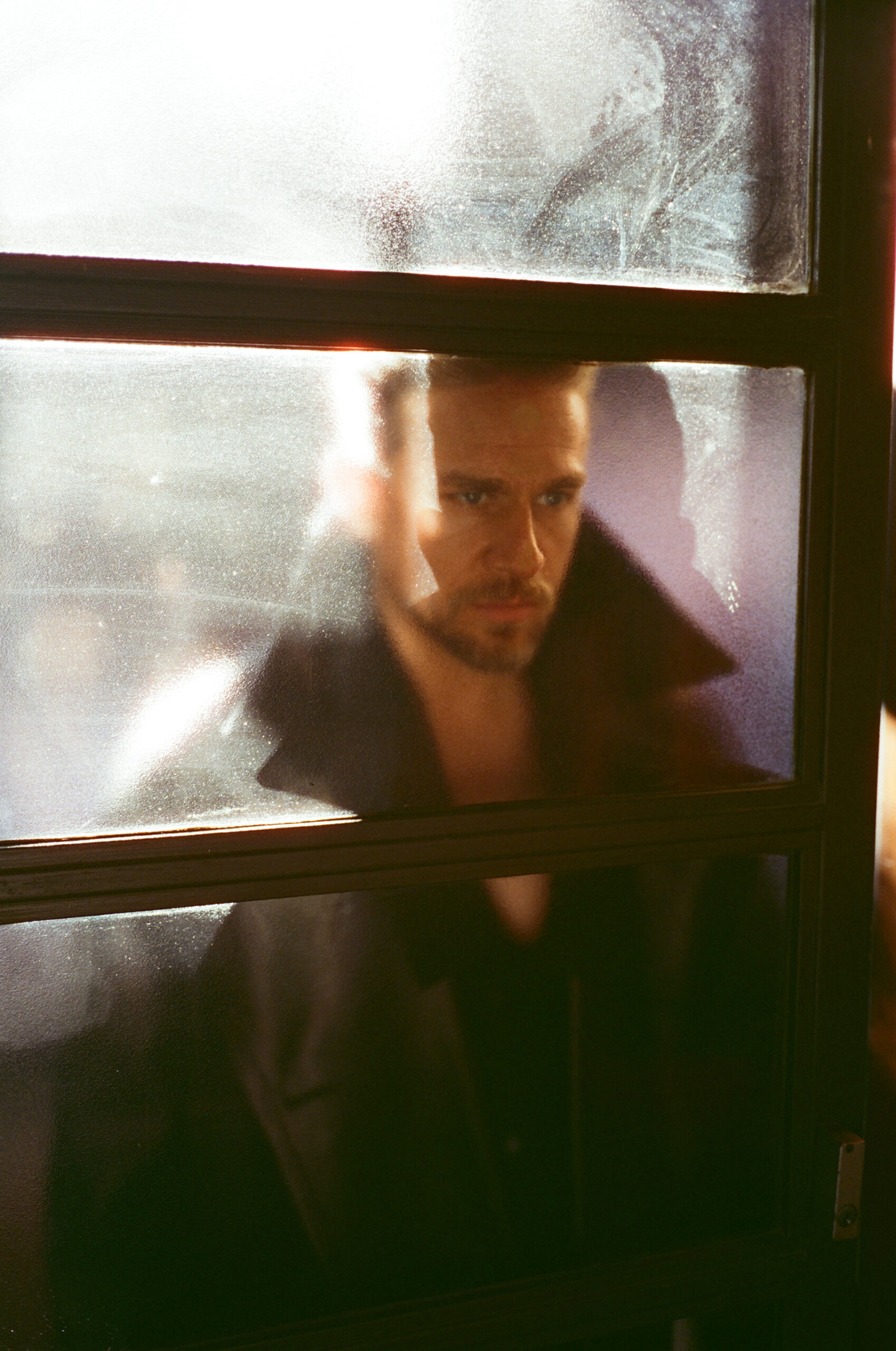
Jacket and Shirt Loewe.
HUNNAM: In terms of shooting, the challenges were never around what might appear on the surface to be difficult subject matter, whether it involves a cadaver or a love sequence or a murder. It was always getting to the truth of these scenes. The scene that springs to mind was the one in episode seven where Ed is finally given the diagnosis that he is acutely schizophrenic. I had a grand emotional response to reading that scene and loved it, and then the actor in me immediately took over and said, “Wow, do I have the goods to be able to deliver this on the day? Because this is an extraordinarily emotional and complex scene to play.” It really was, “Can I reach the level of quality that was consistently in the scripts?”
MURPHY: Well, thank god the film was working that day in the camera, because after we shot it, you told me a story about how you were doing a huge scene on Sons of Anarchy, perhaps your most difficult scene on that, and you did one take and were so relieved and everybody applauded and you thought you nailed it. And then somebody came up to you and said, “The film broke.”
HUNNAM: “Camera didn’t roll.”
MURPHY: I had that happen to me when I was directing Meryl Streep in a scene, and usually it’s the “check the gate” thing. I moved on and the first AD came and said we had a problem. I felt so sad that that moment of Meryl’s was lost forever. We did it again and she’s a pro and we got it, but did you just lose your mind?
HUNNAM: I didn’t. I felt there were two options: to lose my mind or just suck it up, own it, and get right back into it. And the second take was fine. I don’t think it was quite as magical as the first take was, but I was very proud of the scene nevertheless.
MURPHY: In our show, that scene where you’re given your diagnosis in episode seven, I’m so proud of what you did. I love to be able to tell people, “That was Charlie’s first take.” The thing I also loved about our show was the learning, because I’d always been drawn to Ed as a child. I’m from the Midwest and I had always heard of the boogeyman from Plainfield [Wisconsin]. One of my most seminal moments was the first time I was left alone with my younger brother. I was 8. My parents went out on a date and I watched television that night and it was the first time I’d ever seen Psycho. I was so traumatized that I called my grandmother sobbing and she had to come over and console me. And of course, when I was a teenager, I found out Psycho was very much based on Ed Gein’s life. When people ask me, “Why are you doing Ed?” I think he is the most influential and perhaps unknown person of the 20th century. If you think of a lot of things that are cultural canon, like Psycho, [The] Texas Chain Saw Massacre, [The] Silence of the Lambs—these are all based on Ed. I can’t name one other person who’s had a bigger influence in culture in terms of inspiring characters. Did you know all of this before you read the scripts?
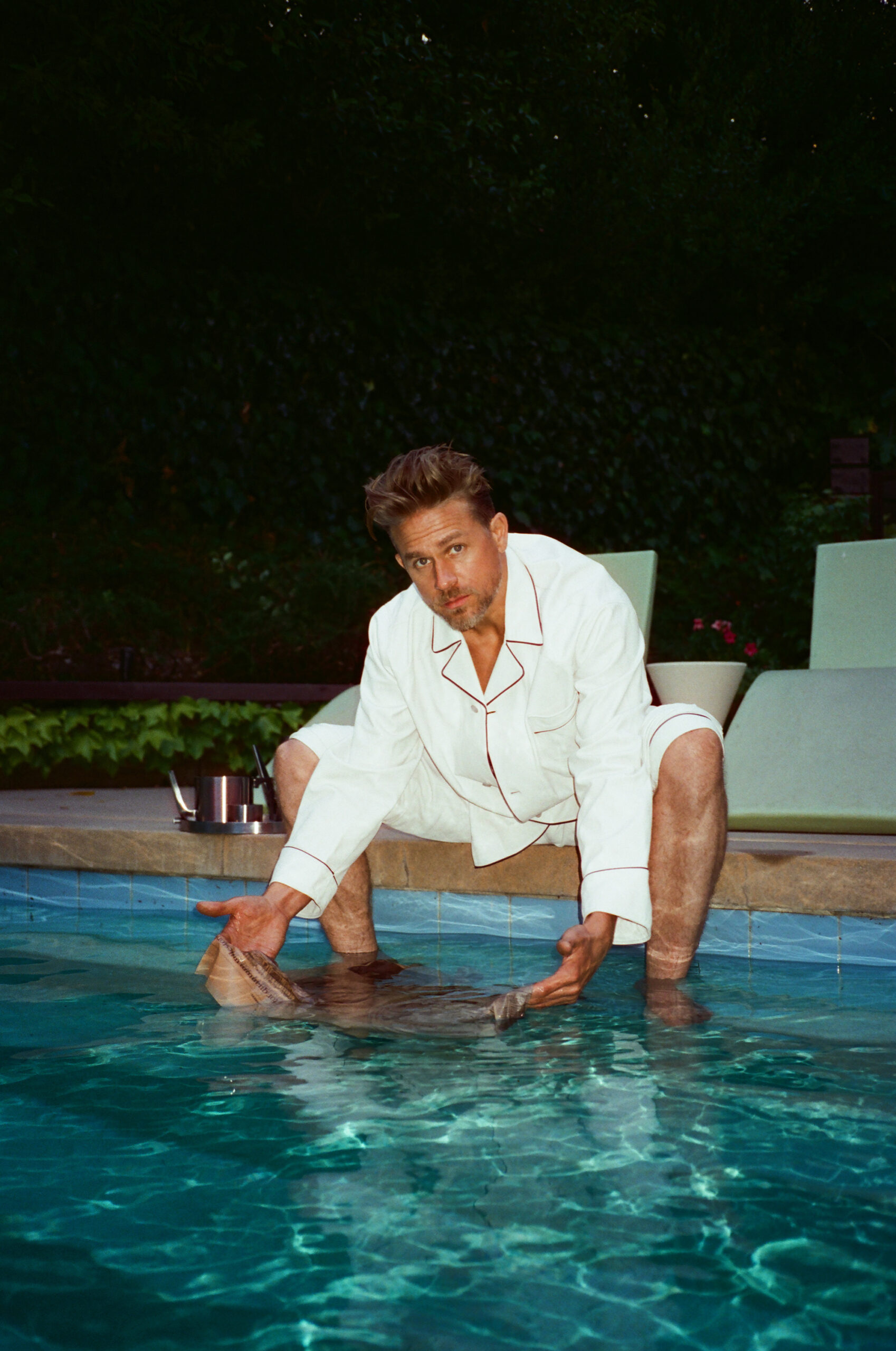
Shirt and Pants Prada.
HUNNAM: I didn’t. I knew a little bit about this man who had been living somewhat in isolation in the Midwest in the ’50s and making furniture and such out of human skin, but I did not know his impact. What’s amazing to note was that he radically transformed the perception in society of what a monster was. Prior to that, we were portraying monsters as Frankenstein and Dracula and werewolves. After Ed Gein, the monster became us.
MURPHY: Yeah. People know a lot about Jeffrey Dahmer or the Menendez brothers, but I wanted to do something cultural. What you just said is so true. Ed changed the way we look at entertainment in some weird way, because suddenly, highlighting human suffering became entertainment that people would pay for. Why do you think we are so drawn to horror and to serial killers? I have a theory. It’s a way for you to put your anxiety into something. It’s a very dark time in the world right now, and I think why the Monster franchise is so popular is because people can watch it, deal with their anxieties, and then move on to something else. It’s cathartic, in a way.
HUNNAM: I agree. We’re all afraid of the boogeyman. Deep inside us, we have a fear of something terrible lurking in the shadows, waiting to whisk us away. Horror gives us a safe way to look at that fear, and maybe by facing it, we become a little less afraid. It’s like a version of exposure therapy. Also, maybe it’s good to remind ourselves that there are things lurking in the shadows. Maybe it’s a lesson that you shouldn’t go poking around in the basement at midnight when the cat goes missing.
MURPHY: You’re obviously a very good-looking young man. For a brief period of time, people called you the baby Brad Pitt. But I’ve always admired and thought it was fascinating that you never wanted to play the “sex symbol” or be the “typical leading man.” Now that I know you, I know the answer—it’s because you’re a brilliant character actor trapped in the body of a good-looking man. Was that a choice or was it a natural thing where you just weren’t interested in those roles?
HUNNAM: I just walked towards the things that were most interesting to me. I don’t know why the things that interest me do. Certainly, true crime and the world of mafioso gangster stuff has always had its appeal, but I grew up in a family that was somewhat adjacent to that, and I went in a different direction in my life. I think that in my early years, that created some insecurity in me, that I didn’t go into the scrap metal business after my father, which is a really tough business. That I instead went and became an actor. So I worked out some of those insecurities by playing those characters rather than being them in real life.
MURPHY: You kind of did a De Niro with the Ed Gein character in that you put yourself on a very rigorous physical transformation regime. I’ve never seen anybody be more disciplined than you. I think you lost 30 pounds.
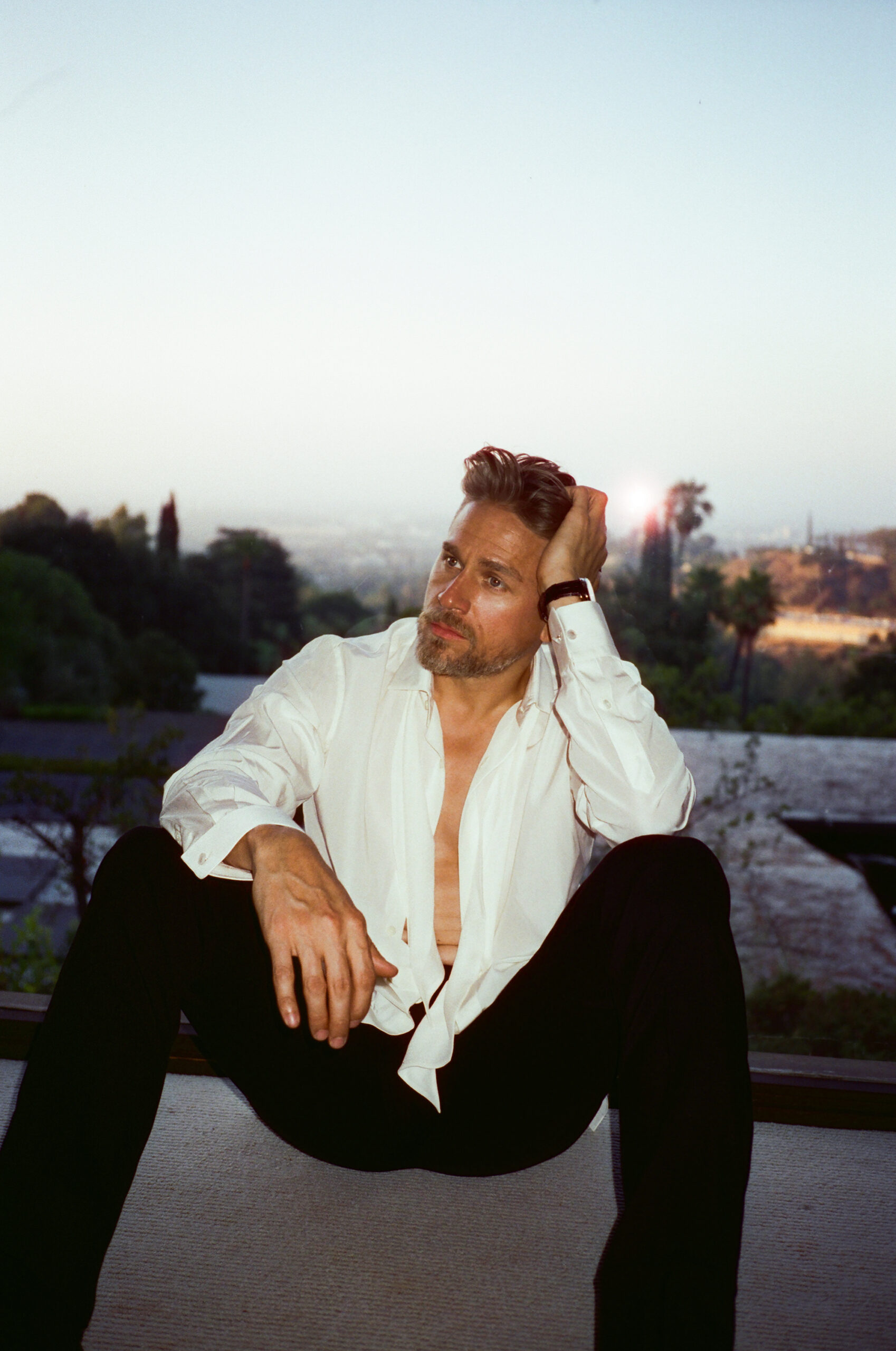
Shirt and Pants Loro Piana. Watch Omega.
HUNNAM: Yeah, 28.
MURPHY: I didn’t ask you to do that. You just had it in your head based on photographs. Could you talk about how you lost all that weight and why that was important to you?
HUNNAM: There was something in his physicality that always appeared haunted and haunting to me. Being that thin, it spoke to the malnourishment both physically and emotionally, which I think is at the center of him. And honestly, it wasn’t until I did my first costume fitting that I realized just how important it was and how much further I had to go to achieve this transformation, because when I put on the clothes for the first time, they didn’t feel right. I’d been losing weight slowly, then I started to very dramatically lose weight.
MURPHY: I finally had an intervention and said, “Stop losing weight.” I recall one day you told me you did three cardio sessions a day?
HUNNAM: It was when I was really trying to lose the weight, but the big thing was just cutting down the amount of food and cutting out all sugar and carbs. It’s tough because it means no alcohol, no bread, no chocolate, all the things I love. But I’m still on the right side of my metabolism to be able to be exacting with myself and actually see a rapid response.
MURPHY: You didn’t tell me this until the day after you did it, but when we finished filming, you went to Ed’s grave. Can you talk about why you needed to do that? Is that because you felt so haunted by inhabiting him for close to a year?
HUNNAM: I was very afraid to let Ed into my psyche and into my heart in the way that I needed to, and I never gave myself a window to step outside of the reality that we created. My partner is incredibly kind to me and generous with my process and allows me to sneak out the back window and come back when the job’s over. Many years ago she said, “Don’t come home until you’re ready to see me.” And so I needed a couple of days in order to shake it off and be fully available to her. But I also needed to say goodbye to Ed. So I drove to Plainfield and spent five or six hours at his grave and walking around the town. I wanted to express one thing specifically to him, that I hope that we had for the first time told his story in an honest and unbiased way.
MURPHY: One of the things about that graveyard that I find so interesting is that his grave site continues to be, almost 40 years after his death, a mecca for many people. They visit it as much as they visit Jim Morrison’s, for very different reasons. And people have stolen his headstone. Why do you think people are so fascinated with going there?
HUNNAM: I don’t know how to answer the question, but it’s an eerie place to be, because it’s not only where Ed was buried, but it’s also the site of the vast majority of his grave robbings. So it’s very complex for the residents, too. I imagine that must have been very controversial to allow him to be laid to rest in the area that he had exhumed so many graves.
MURPHY: Did you feel his presence there?
HUNNAM: Very much. I cried a little bit. I talked to him a lot. I felt like I needed to say everything that I needed to say. I think we’ve done a beautiful job of humanizing him for good and bad. There’s a lot of reasons to feel empathetic towards Ed. And there’s a lot of reasons to be repulsed and to hold him accountable for what he did. But I think you and Ian did a fantastic job walking that middle ground.
MURPHY: Well, thank you for that. Thank you for talking and I will see you on set very soon.
HUNNAM: I will see you on set. Thank you, Ryan.
MURPHY: Peace out.
———
Grooming: Kim Verbeck using Chanel Beauty at The Wall Group.
Photography Assistant: Cesca Coppola.
Fashion Assistant: Natalie O’Campo.
On-set Production: Eppy.
Special Thanks: Alex Miller.

